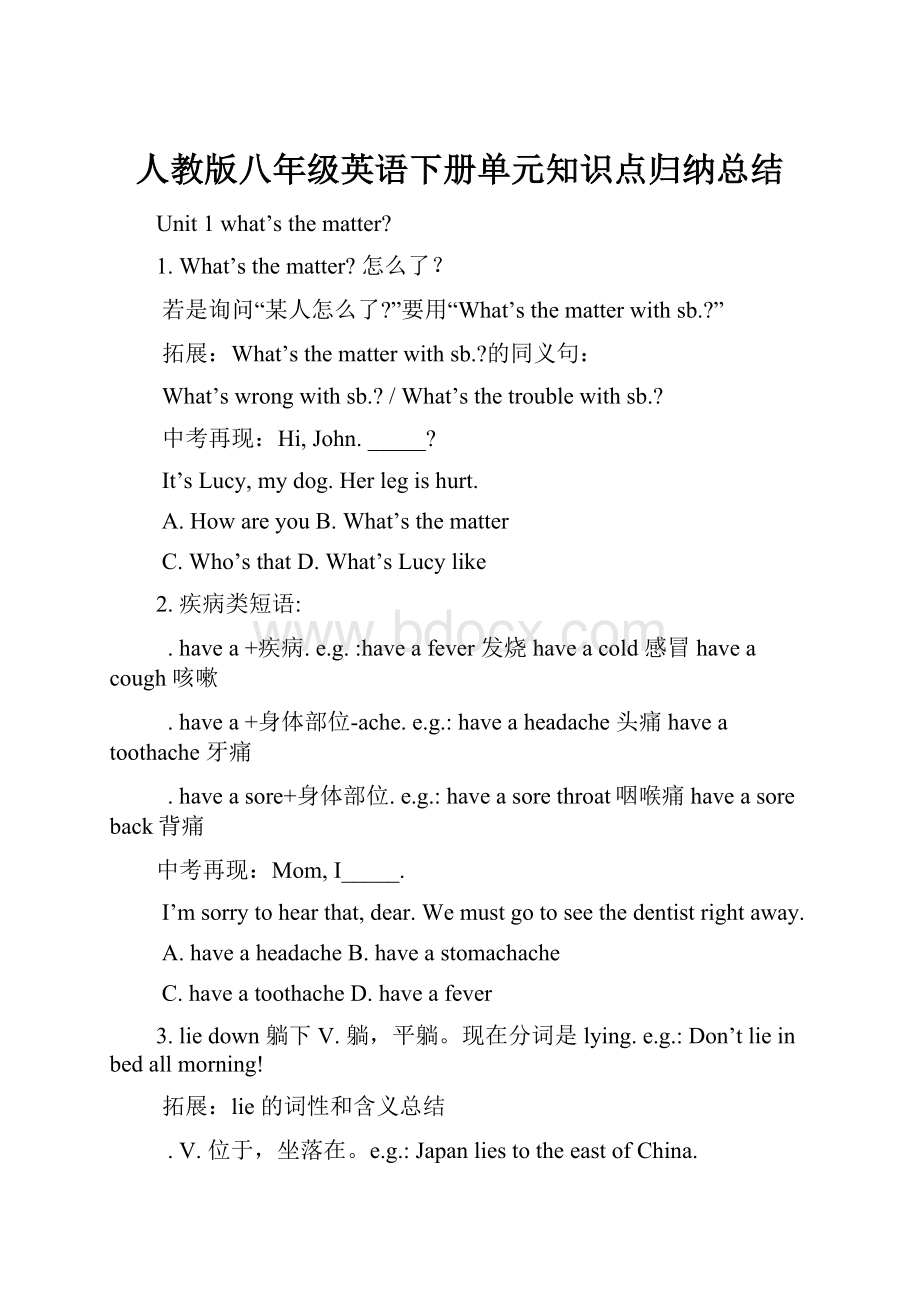人教版八年级英语下册单元知识点归纳总结.docx
《人教版八年级英语下册单元知识点归纳总结.docx》由会员分享,可在线阅读,更多相关《人教版八年级英语下册单元知识点归纳总结.docx(52页珍藏版)》请在冰豆网上搜索。

人教版八年级英语下册单元知识点归纳总结
Unit1what’sthematter?
1.What’sthematter?
怎么了?
若是询问“某人怎么了?
”要用“What’sthematterwithsb.?
”
拓展:
What’sthematterwithsb.?
的同义句:
What’swrongwithsb.?
/What’sthetroublewithsb.?
中考再现:
Hi,John._____?
It’sLucy,mydog.Herlegishurt.
A.HowareyouB.What’sthematter
C.Who’sthatD.What’sLucylike
2.疾病类短语:
.havea+疾病.e.g.:
haveafever发烧haveacold感冒haveacough咳嗽
.havea+身体部位-ache.e.g.:
haveaheadache头痛haveatoothache牙痛
.haveasore+身体部位.e.g.:
haveasorethroat咽喉痛haveasoreback背痛
中考再现:
Mom,I_____.
I’msorrytohearthat,dear.Wemustgotoseethedentistrightaway.
A.haveaheadacheB.haveastomachache
C.haveatoothacheD.haveafever
3.liedown躺下V.躺,平躺。
现在分词是lying.e.g.:
Don’tlieinbedallmorning!
拓展:
lie的词性和含义总结
.V.位于,坐落在。
e.g.:
JapanliestotheeastofChina.
.V.撒谎,说谎。
lietosb.对某人撒谎。
e.g.:
Don’tbelieveherbecauseshealwayslies.
.N.谎言。
telllies/alie说谎。
e.g.:
Youshouldn’ttellliestoyourparents.
注意
含义
过去式
过去分词
躺,平躺
位于,坐落在
lay
lain
撒谎,说谎
lied
lied
4.if引导的条件状语从句时,主将从现。
中考再现:
Stopsmoking,Joe!
You_____yourselfifyoukeepondoingitlikethat.
A.willkillB.havekilledC.killD.killed
5.
seesb.doingsth.
表示“看到某人正在做某事”,强调动作正在进行
seesb.dosth.
表示“看到某人做某事”,强调动作经常发生或看到某个动作发生的全过程
e.g.:
Wesawtheboyplayingcomputergames.
Weoftenseetheboyplaycomputergames.
Wesawtheboylockthedoorandwalkoutoftheroom.
WhenIwalkedthroughtheplayground,Isawmyfriends_____football.
A.playB.toplayC.playingD.isplaying
6.get短语
getup起来,起床getto(=reach,arrivein/at)到达geton上车
getoff下车getinto陷入,参与getin进入,到达getback回来
getready(for....)(为....)做准备getonwellwithsb.和某人和睦相处
7.toone’ssurprise令某人惊讶的是;surprise是名词,惊讶,惊奇。
8.havetrouble/difficultydoingsth.做某事时遇到困难。
Ialwayshavemuchtrouble____Englishwords.Canyougivemesomeadvice?
A.torememberB.rememberC.remembering
9.beusedtodoingsth.习惯做某事。
e.g.:
Theyareusedtolivinginthebigcity.
usedtodosth.过去常常做某事。
e.g.:
Heusedtoplayfootball,butnowhelikesplayingbasketball.
10.takerisks/arisk.冒险。
riskV.冒险。
11..runout用完,用尽,主语通常是“时间,金钱,食物”等无生命的东西。
e.g.:
Allthemoneyranout.
.runoutof用完,主语通常是人。
e.g.:
Wehaverunoutofourpocketmoney.
12.off短语:
turnoff关闭,关掉takeoff起飞,脱掉putoff推迟,拖延
getoff下车giveoff发出,散发setoff出发
中考再现:
Wehaveto____thebikeridebecauseofthebadweather.
A.putoffB.turnoffC.takeoffD.getoff
13..importantadj.重要的unimportantadj.不重要的importancen.重要性
中考再现FromtheshowRunningMan,wecanlearnthe________ofteamspirit.
.makeadecision=decide后接不定式,“做出决定,决定.....”
Imadeabig_______tostopdoingmyjobforafewmonths.
.beincontrolof掌管,控制outofcontrol脱离控制
中考再现:
Thecarwasoutof_____andhitatreebytheroad.
A.dangerB.breathC.controlD.practice
14..keep(on)doingsth.继续做某事,坚持做某事。
中考再现:
Hekept____sothathecouldbeinhealth.
A.exerciseB.exercisingC.toexercise
.giveup“放弃”代词放中间giveupdoingsth.放弃做某事
中考再现:
Nomatterhowharditis,don’t_____.Thingswillbebetterinthefuture.A.giveoutB.giveupC.giveaway
15.重难点全解:
情态动词should
should的用法
作情态动词时,表责任和义务,意为“应当,应该”,可用于任何人称。
肯定句
主语+should+动词原形+其他
否定句
主语+shouldnot/shouldn’t+动原+其他
一般疑问句
Should+主语+动原+其他?
特殊疑问句
特殊疑问词+should+主语+动词原形?
近义表达:
oughtto/besupposedtodo
翻译:
现在你应该戒烟了。
16.易错易混全解
toomany
表示“太多”,修饰可数名词的复数
toomuch
表示“太多”,修饰不可数名词
muchtoo
表示“太”,修饰形容词或副词
Themeatis___expensiveandeating____meatisn’tgoodforourhealth.
A.toomuch,muchtooB.toomuch,toomuchC.muchtoo,toomuchD.muchtoo,toomany
because
是连词,“因为,由于”,引导原因状语从句
becauseof
是介词短语,“因为,由于”,后跟名词、代词或动名词
Milliemadeafewmistakesintheexam____hercarelessness.
A.becauseB.sothatC.asaresultD.becauseof
die
V.“死,去世,逝世”
dead
adj.“死的,死亡的”
death
n.“死,死亡”
中考再现:
LeiFeng____formanyyears,buthisspiritisstillencouragingus.
A.diedB.hasdiedC.wasdeadD.hasbeendead
Unit2I’llhelptocleanupthecityparks.
1.hopetodosth.希望做某事,含hopetodosth.的句子可以转换为宾语从句。
eg:
Ihopetopasstheexam.=IhopethatIcanpasstheexam.
agreetodosth.
同意做某事
decidetodosth.
决定做某事
refusetodosth.
拒绝做某事
remembertodosth.
记得做某事
forgettodosth.
忘记做某事
trytodosth.
尽力做某事
wanttodosth.
想要做某事
2.“动词+up”的短语小结:
cleanup打扫干净cutup切碎growup长大setup熬夜setup建立,设立
stayup熬夜wakeup醒来,叫醒takeup占用giveup放弃useup用完
cheerup使振作起来,使高兴起来(代词必须放中间)putup搭建,张贴
makeup组成,编造endup最终成为,最后处于
中考再现:
Manyvolunteerswillhelpto______thecityparksnextparksnextFriday.A.giveupB.pickupC.cleanup
3.giveout:
发出,放出(热,光等)Thesungivesoutlightandheattotheearth
用完,耗尽Wehadjustreachedhomewhenthepetrolgaveout.
公布,发表Thenewsoftheeventwasgivenoutovertheradio.
4.give的短语:
giveaway捐赠,赠给giveup放弃giveback归还
giveoff发出,放出givein让步,屈服givesb.sth.=givesth.tosb.给某人某物
5.putoffdoingsth.推迟做某事e.g.:
Wecan’tputoffmakingaplan.
常见的put短语:
puton穿上,戴上putout熄灭,扑灭putup搭起,升起,张贴putupwith容忍putaway收起来
中考再现:
Theyheardthepartywas______becauseoftheexam.
eupwith提出,想出(答案,计划等)
He____________manyideastosolvetheseproblemalready.
7.usedto变否定句或疑问句时常借助助动词did.
肯定句
主语+usedto+动词原形...
否定句
主语+didn’tuseto+动词原形...
一般疑问句
肯定答语
Yes,主语+did.
否定答语
No,主语+didn’t.
8.care的延伸:
派生词:
careful小心的carefully小心地careless粗心的carelessly粗心地
短语:
carefor照顾,喜欢careabout关心,在意takecare小心takecareof照顾,照料
9.such+a/an+形容词+名词=so+形容词+a/an+名词“如此........”
注意:
当名词前有many,much,few,little修饰时,要用so,而不用such.
中考再现:
Wehad_____awfulweather_____wecouldn’tfinishtheworkontime.
A.at’A.lonely,lonely________________________________________________________________________________________________________so,thatB.such,thatC.suchan,that
10.-ing是名词后缀。
e.g.:
reading阅读writing写作spelling拼写swimming游泳skating滑冰fishing钓鱼smoking抽烟
11.besatisfied/pleasedwith...对....满意satisfactionn.满意,满足
12.常见的“take+介词/副词”短语:
takedown写下,拆除takeoff起飞,脱掉takeout取出,掏出takein吸收takeover接管takeaway带走takeup占用takeback收回
中考再现:
I____myfather’swetshoesandwashedhisfeet.
A.tookoutB.tookoffC.tookplace
13.常见的“动词+away”的短语:
throwaway扔掉,丢弃runaway逃跑getaway逃离passaway逝世keepaway离开,使不接近takeaway带走goaway离开putaway收起来giveaway捐赠stayaway远离
----Whatareyoudoing,Mum?
----I’m____someoldthingsforayardsale.
A.givingawayB.hurryingupC.cleaningoutD.walkinginto
14.besimilarto和....相似/类似e.g.:
Hisdressissimilartomineincolor.
15.常考的不同时态的被动语态:
一般现在时
am/is/are+done
一般过去时
was/were+done
现在进行时
am/is/arebeing+done
一般将来时
willbe+done
am/is/aregoingtobe+done
现在完成时
have/hasbeen+done
中考再现:
Thesemodelcars____inChinain2013.
A.aremadeB.weremadeC.makeD.made
16.makeit+adj.(+forsb.)+todosth.使某人做某事........
findit+adj.(+forsb.)+todosth.发现....怎么样
17.beexcitedabout因...而兴奋不已e.g.:
Wewereexcitedaboutthegoodnews.
同根词:
excitev.使激动,使兴奋excitedadj.激动的,兴奋的(常用来修饰人)excitingadj.令人激动的,兴奋的(常用来修饰事或物)excitementn.激动,兴奋
Theyare____aboutthe____news.A.excited,excitedB.exciting,excitingC.exciting,excitedD.excited,exciting
18.could的用法:
表建议,语气较委婉“可以”e.g.:
Youcouldhelptocleanthepark.
can的过去式,表示过去具备的能力。
e.g.:
Shecouldn’tdressherselfuntilfive.
19.动词不定式的用法
A.动词不定式的语法功能
作主语
TolearnEnglishwellisveryimportant.=ItisveryimportanttolearnEnglishwell.
作表语
Myjobistolookafterpatients.
作宾语
Wewanttogoswimming.
作宾语补足语
Sheinvitedmetogototheconcert.
作定语
Ihavesomethingimportanttotellyou.
作状语
Shegotupearlytocatchtheearlybus.
中考再现:
Iwastiredout,soIstoppedthecar____ashortrest.
A.haveB.havingC.tohaveD.had
状语:
状语是用于说明地点、时间、原因、目的、结果、条件、方向、程度、方式和伴随状况等的一种句法成份.
状语一般由副词、介词短语、分词和分词短语、不定式或相当于副词的词或短语来担当.其位置一般放在句末,但也可放在句首或句中.
1.副词是一种用来修饰动词,形容词,副词或全句的词,说明时间,地点,程度,方式等概念.
HespeaksEnglishverywell.他英语说得非常好.(very是程度副词,用来修饰well.verywell是修饰speak的程度状语)
2.介词短语
Theboywaspraisedforhisbravery.那个男孩因为他的勇敢受到了表扬.(forhisbravery在句中作原因状语)
3.从句作状语
IfIamnotbusytomorrow,Iwillplayfootballwithyou.如果我明天不忙,我将和你一起踢足球.(IfIamnotbusytomorrow在句中作条件状语)
4.不定式在句子中可以作目的状语.
Icomespeciallytoseeyou.我专门来看你.(toseeyou在句中充当目的状语)
5.分词作状语
Havinghadaquarrelwithhiswife,helefthomeinabadtemper.和他妻子吵架后,他生气地地离家出走了.(havinghadaquarrel在句中作时间状语)
Remindednottomisstheflightat15:
20,themanagerleftfortheairportinahurry.(remindednottomisstheflightat15:
20在句中作时间状语)
由于时间关系,所附例句有限,希望你能对状语有一个概要的了解.
B.“特殊疑问词+动词不定式”结构
动词不定式可以用在疑问词what,how,when,where,which等之后,作主语,宾语,表语等。
e.g.:
Howtogetthereisaproblem.(作主语)
Idon’tknowwhattosay.(作宾语)
ThequestionishowtolearnEnglishwell.(作表语)
中考再现:
-----It’simportantforustoknow_____allthesubjects.
----Yeah,groupworkismyfavorite.
A.howtostudyB.whentostudyC.whichtostudyD.whattostudy
C.含动词不定式的常用搭配
有些动词只能跟动词不定式作宾语plan,hope,agree,decide等。
e.g.:
Weplantogoclimbing.
Myfatheragreedtotakeustothemuseum.
Theydecidetojointheswimmingclub.
有些动词后要跟动词不定式作宾语补足语:
wantsb.todosth.
想要某人做某事
tellsb.todosth.
告诉某人做某事
encouragesb.todosth.
鼓励某人做某事
warnsb.todosth.
警告某人做某事
asksb.todosth.
请求某人做某事
advisesb.todosth.
建议某人做某事
中考再现:
Weadviseparents___theirchildrenathomealoneinordertokeepthemawayfromdanger.A.leavingB.nottoleaveC.leaveD.toleave
20.repair,mend,fix区别
repair意为“修理”,修理的对象着重于破损,毁坏或发生故障不能正常使用的物体。
e.g.:
WhenIgothome,mybrotherwasrepairinghisradio.
mend意为“修理”,修理的对象是一些琐碎的物品。
如粘贴的小用具,玩具,要缝补的衣物等。
e.g.:
Mykiteisbroken.Canyoume